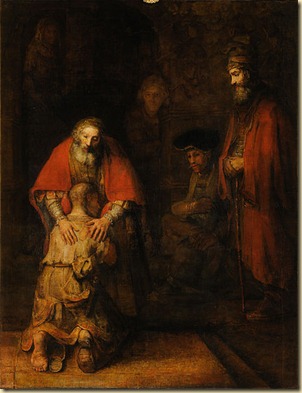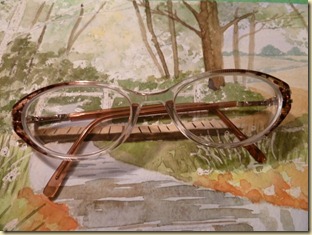Do you see him there, off to the side?
It’s the big brother, the one with the piously crossed hands, the unfeeling eyes, the ‘upright’ posture, looking on unmoved as his father welcomes his filthy ‘prodigal’ brother home.
The prodigal’s unsatisfying profligate lifestyle drove him back to the Father but what about his big brother?
What’s to be done for him?
The story of the prodigal’s return is much celebrated. Songs have been composed, great artwork created, movies made, and books written, all in celebration of the returned prodigal. But what about the older brother? The story is after all, the story of two sons– “There was a man who had two sons.” What’s to become of the second son? He didn’t leave home on a wild impulse to spend his inheritance. He kept the home fires burning. He was an obedient son. He didn’t ask for much apparently. But oh the sense of entitlement he’s nurtured!
It seems to me, most of us are born with the propensity toward being either a prodigal or the big brother (sister) to one. We give a lot of thought and pity to prodigals. Their return is a cause of rejoicing in heaven and on earth! But what about the pious older brother? He’s really not very likeable. He isn’t even happy to see his brother come home. He does not share His Father’s heart of compassion. He is thinking only of himself, and with these thoughts come envy and resentment. He has stayed home, denied himself worldly pleasures, done the work, postponed the reward, guarded his shekels and perhaps even anticipated being the sole heir to his father’s remaining possessions. But here is this scoundrel brother. He’s squandered all that was rightfully his and now he’s back to beg for more. And Father’s throwing him a grand party—with whose money?! He doesn’t deserve it. Why doesn’t anyone ever get excited over me? throw me a party? celebrate me? I’m the one who deserves it. The older brother seethes with self-righteous protest, and refuses to be dissuaded or to join the celebration. Here is the really lost son. What’s to be done for him?
He too is in desperate need of the Father’s mercy. Only he doesn’t see it. He only has eyes for his own goodness. Not unlike the Pharisee who stood ‘praying’ (applauding himself) in the temple “I thank thee that I am not like other men. I fast…I tithe…” (Lk.18:11)
The younger brother had returned to the Father with a new appreciation of Home because his wealth was spent and ‘he began to be in need’. The older brother hasn’t yet come to such personal destitution. He’s still clinging to his good track record… still assuming he’s the favored son with a right to everything because he’s been ‘good’. But he is far from comprehending the Father’s heart or finding fellowship there. He turns a sullen ear to His entreaty to come join the celebration. His pride will not let him.
What does it take to bring an elder brother back to the Father?
It is no easy road for a Pharisee. Pride is an enormous stumbling stone. Compassion and a warm welcome may draw those who recognize their personal bankruptcy but not so, a Pharisee. One who has spent his life cultivating ‘righteousness’ of a sort feels little need of a Saviour. To admit failure feels like personal suicide. To remain oblivious to it requires increasing blindness and hardness of heart. What does it take to convince a Pharisee of the error of his ways?
For Saul (later named Paul) it took a blinding confrontation that knocked him to his knees and commanded his attention. Humbling. Later despite his being ‘as to the law, a Pharisee’ and ‘as to righteousness under the law, blameless’ (Phil. 3:5,6) he would profess to being the ‘chief’ of sinners (I Tim.1:15), and would claim all his merits as rubbish compared to knowing Jesus and sharing in His righteousness by faith.
For Nicodemus, it took watching Jesus’ life and having a pointed late-night conversation with Him: “You must be born again.” Later he would share the task and expense of wrapping Jesus’ body with linen and costly spices. It appears he too had come to believe and to love Jesus.
Other Pharisees would eventually find their way from arrogant self-righteousness to acknowledging their need of forgiveness. But it was no easy road.
It often called for shock treatment to penetrate their resistant veneer. Consider Jesus’ own words addressed to the Pharisees:
“You brood of vipers! Who warned you to flee from the wrath to come?” Mt.3:7
“Woe to you, scribes and Pharisees, hypocrites! For you are like whitewashed tombs which on the outside appear beautiful, but inside they are full of dead men’s bones and all uncleanness.” Mt.23:27
“Woe to you, blind guides.” Mt.23:16
“You fools and blind men!” Mt. 23:17
“You serpents, you brood of vipers, how will you escape the sentence of hell?” Mt.23:33
“Woe to you! For you are like concealed tombs, and the people who walk over them are unaware of it.”Lk.11:44
You are of your father the devil, and you want to do the desires of your father. ” Jn.8:44
Then there were Jesus’ custom-made parables. This story of a father and his two sons is the third in a trio of parables about lost and found things, about the repentance of sinners and the unparalleled joy their return brings the Father. Jesus told these specifically for the Pharisees and scribes, in response to their grumbling at how He mingled with tax collectors and ‘sinners’.
He explained first in terms of sheep, likening the finding of a lost one to the repentance of a sinner. “I tell you,” He said, “there will be more joy in heaven over one sinner who repents than over ninety-nine righteous persons who need no repentance”. What were they to make of these statements? They considered themselves righteous and worthy of great honor, clearly above needing repentance, not like these ‘sinners’ with whom Jesus preferred to keep company. They were offended. Jesus seemed to be putting a premium on repentance… not ‘righteousness’. What was He implying?
The next tale was of a long-lost coin being found. He drove it home again with this idea of all the angels in heaven rejoicing, not over one ‘righteous’ Pharisee but over ‘one sinner who repents’. (Lk.15:10)
And the grand finale was this story of a man and his two sons. (Luke 15:11ff) This time the Pharisees are symbolically painted into the picture as the ‘elder brother’ who sullenly stood by as his long-lost brother was welcomed home after squandering his inheritance on wild living. This time they too are winsomely addressed as the Father comes to personally entreat his bitter son to join the celebration also. He listens to the son’s grievances: I’ve served you these many years. I’ve never disobeyed your commands. And I’ve never been given even a goat for a barbecue with my friends. But when this ‘no-good’ son of yours decides to come home you kill the fatted calf for him!
Then the Father offers his offended son a fresh perspective, reminding him of how much more he has had all along, but somehow missed seeing: “Son, you are always with me, and all that is mine is yours.” (Lk.15:31) How is a party and a fattened calf more enviable than living with the Father all along and sharing all He owns? How is riotous living and its bitter consequences something to be envied? How is this sullen, jealous response fitting on such a day?! It makes sense only to the self-righteous son and the story ends without indicating whether he had a change of heart. And the Pharisees to whom it was told are faced with themselves and their very lost condition.
Will they see themselves in the story and come to their senses? The story leaves me wondering which is the harder redemption? that of a sinner who has come to his senses and knows who he is, or that of a sinner deceived by his own valiant efforts into thinking himself above the need for forgiveness?
One has ‘blown it’ and is well aware he does not deserve to be called a son. He is aware of his unworthiness and has little expectation of acceptance. But still he trusts the Father and returns humbly. This one the Father welcomes home and forgives.
The other, exalted by avoidance of his particular list of ‘sins’, thinks himself worthy of sonship, sees no need of forgiveness and so remains himself estranged from the Father while he strives to be ‘good’ on his own.
He’s not much fun to be around. He’s got a nasty arrogant attitude. What a kill-joy besides! Who wants him at the party? What kind of guy is this that he can’t even get excited when his little brother comes home? Truth is, he’s miserable. He cannot live up to his own standards and he knows it. His own failure drives him to compare himself with others, to judge and to condemn. He bolsters his ego based on his own biased evaluations, turning a blind eye to his own heart. He’s not happy, and certainly not joyful. Counting on his own goodness to commend him to the Father is not working out. He needs just what that ‘no-good’ brother of his needed—forgiveness and a change of heart.
I have a great empathy for this older brother… we have more in common than I like to admit. I suspect he was born a ‘pleaser’. He learned early that avoiding disapproval was the next best thing to actually being ‘good’. Winning accolades for being such a ‘good boy’, he learned to play the game, and worse yet, to believe that he really was better than that younger brother who got all the spankings! This was the beginning of the slippery slope of pride. He chose to do the ‘right’ things, but for the wrong reasons. He chalked up his good conduct as ‘brownie points’ making him superior to most everybody else. He formulated a list of ‘do’s and ‘don’ts and a suspicion of all things pleasurable. These were usually deferred earning him more points for ‘righteousness’. And soon he was sure he was entitled to his inheritance; he’d earned it after all.
Hmmm… just my hypothesis, based on someone I know quite well.
And what’s to be done for such an elder brother? Why, the same thing that was done for the younger brother. He needs to come humbly to the Father bringing words of repentance. “Father, I have sinned against heaven and before you. I am no longer worthy to be called your son…” And the rest will be the Father’s doing—the robe of righteousness, the ring of promised inheritance, the shoes of the gospel of peace…and the fattened calf and the celebration. And I’m invited to join in because the Father has invited me too. This is the Gospel, and it keeps on being good news for me!
“The Christian gospel is that I am so flawed that Jesus had to die for me, yet I am so loved and valued…that Jesus was glad to die for me. This leads to deep humility and deep confidence at the same time. It undermines both swaggering and sniveling. I cannot feel superior to anyone, and yet I have nothing to prove to anyone. I do not think more of myself nor less of myself. Instead, I think of myself less. I don’t need to notice myself—how I’m doing, how I’m being regarded—so often.” –Tim Keller in The Reason for God, p.187.
–LS
“For we do not present our pleas before you because of our righteousness, but because of your great mercy. O Lord, Hear; O Lord, forgive…for your own sake, because your people are called by your name.” Daniel 9:18
“Come to me, all who labor and are heavy laden, and I will give you rest. Take my yoke upon you, and learn from me, for I am gentle and lowly in heart, and you will find rest for your souls. For my yoke is easy, and my burden is light.” Mt.11:28-30
Not that I have already obtained this or am already perfect, but I press on to make it my own, because Christ Jesus has made me his own. Phil.3:12



